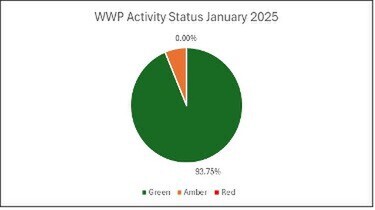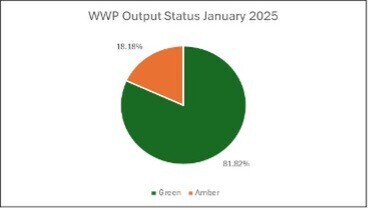Every year, the WWP reports to the Kaitiaki Advisory Board, WRC the WEL Energy Trust and our valued stakeholders on our performance and achievements over the past 12 months. The report gives an aggregated summary, as well as a detailed breakdown of the performance of each of our major programmes of work, measured against our 2024/25 Business Plan.
Overall, we are very pleased with the progress made in 2024, especially given the scale of the task we have taken on, our small size and limited mandate. Activity performance has increased substantially from 75 to 94% as major projects have been completed. Output achievement has improved from 54% to 82%. Overall results in 2024 were in line with business plan expectations, and in several key areas exceeded expectations.
Another change to this year’s report has been to add a commentary for each section on impacts. The purpose of this is to address questions which arose during the review about the impact which the WWP has had. In line with the out theory of change, the commentary links back to the 4 impacts mentioned in our business plan.
A detailed report on our achievements for 2024 can be seen here.
The collective ambition to do something different is what drove the WWP’s creation and the development of its goals and targets in 2019-20. The WWP is not mandated to be a policy maker, funder or a service delivery organisation. Its role is to work in the space between grass roots communities and institutional funder/service agencies, accepting uncertainty and complexity, shedding light and sharing insights which will enable us all to move towards greater outcomes. While the WWP was established with a strong focus on wellbeing outcomes/impacts (via the targets), it was always anticipated that these would be achieved collectively, with the WWP acting as a convenor, facilitator and guide, not necessarily the deliverer, funder or “owner.”
The Theory of Change in the WWP Business Plan describes the chain of results, outcomes and impacts which the WWP creates and contributes towards. Like almost all organisations involved in complex/wicked issues, the achievement of long-term outcomes and impacts is never the result of a single agency or action, but reflects the collective actions of many actors, some of which may help drive towards the goals, and some may confound drive us away/back. Even when there is positive progress towards an outcome, the level of attribution between an action and result is highest for inputs/outputs, and low, even confusing, for outcomes and impacts.
When measured against our business plan, we have achieved a very high percentage of our activity and outputs targets. Importantly, in all cases, our work has had positive outcomes and impacts for the people and communities we work alongside, which this report has described and summarised.
We sincerely thank our team of dedicated and outstanding team members and project partners. A particular thank you to our major funders for 2024 WEL Energy Trust, Waikato Regional Council, Trust Waikato and MAS Foundation. We look forward to working with all stakeholders, funders and the community on the next phase of the project, in whatever form is best and has the greatest positive impact for wellbeing in the Waikato.



